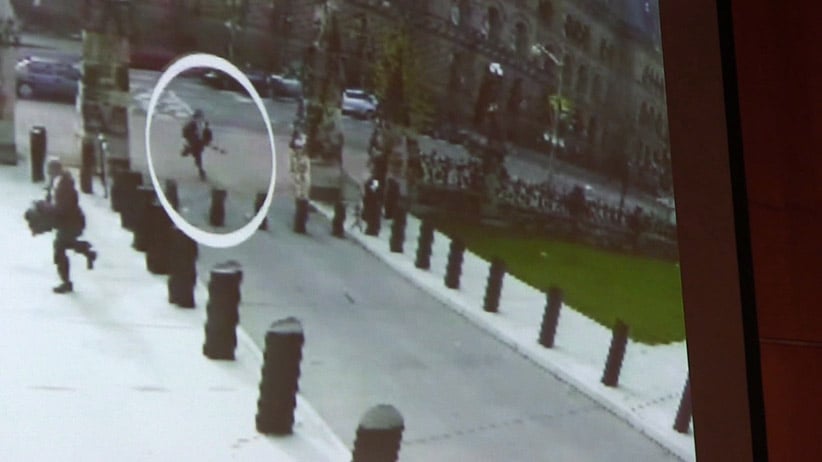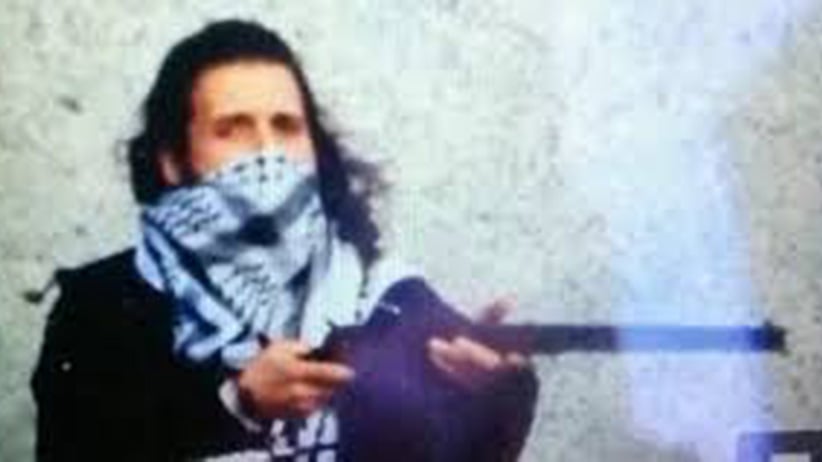Mother’s emails offer new glimpse into son’s rampage on Oct. 22
Michael Zehaf-Bibeau’s mother, a senior civil servant, received an outpouring of support from colleagues after the Ottawa attack, new documents show
Michael Zehaf Bibeau is shown in this Twitter photo posted by @ArmedResearch, which said in a Tweet it came from an Islamic State media account. RCMP said at a news conference Thursday, Oct. 23 that police are attempting to identify the source of the photo and don???t know who took it. RCMP also said Zehaf Bibeau, killed after a deadly shooting at the National War Memorial and on Parliament Hill, was not on the RCMP’s watch list of potential high-risk travellers.
Share

As planned, Susan Bibeau was working in Vancouver that Wednesday morning. A senior executive at Canada’s Immigration and Refugee Board (IRB), headquartered in Ottawa, she had flown to the West Coast for a few days of staff meetings and to conduct interviews for a vacant job posting. At 8:24 a.m. local time, a colleague forwarded her an email, alerting Bibeau that one of the candidates vying for the open position had dropped out. “Quite surprising,” she typed back, “they are falling like flies.”
It was Oct. 22, 2014. On the other side of the country, a Canadian soldier was dead, shot in the back as he stood sentry at the National War Memorial. The masked rifleman who pulled the trigger was also lying in a pool of blood, cut down by a flurry of bullets after storming the front doors of Parliament.
Amid the chaos, police rushed to lock down the capital’s core, including the IRB’s head office on Slater Street, a short walk from the crime scene. Among the hundreds of employees ordered to stay inside was Line Paradis, Bibeau’s executive co-ordinator. “Hello Susan,” she wrote to her boss, en francais, at 1:08 p.m., “we are in a state of emergency in Ottawa, I’m not sure you heard.”
“Yes,” Bibeau replied from Vancouver, “I just got out of an interview.” At the time, she had no idea the gunman was her 32-year-old son, Michael Zehaf-Bibeau.
At some point over the next two hours, she learned the horrifying truth. “Salut,” Bibeau wrote back to Paradis at 3:01 EST, “if you have a chance, call me.” The subject line was: “situation à Ottawa.”
Related post: Bearing Witness: The story of Oct. 22 in the words of those who were there
By 4:30 p.m., authorities had released the shooter’s identity—and his mother, thrust into the media’s glare, was scrambling to catch a plane back east. “Hello Susan,” her Vancouver colleague emailed later that afternoon. “I went to the 17th floor to look for you. Can you send me the deck for tomorrow’s meeting? Have you left the office?”
“Hi Alice,” Bibeau responded. “I am leaving for Montreal tonoght [sic] can you please pick up my stuff on the 17 and present the priorities to the Members tomorrow. Sorry.” Two minutes later, she wrote back to apologize again.
Susan Bibeau did not return to work for another three months, taking an extended leave of absence that just ended on Jan. 27—the same week the Harper Conservatives, responding in part to the “cold-blooded” actions of her estranged son, tabled the most sweeping anti-terror legislation since 9/11. In written statements to the media, Bibeau has expressed her “deepest condolences” to Cpl. Nathan Cirillo’s family while struggling to explain why her child, a crack-addicted Muslim convert, would unleash “such senseless” violence. “Most will call my son a terrorist, I don’t believe he was part of an organization or acted on behalf of some grand ideology or for a political motive,” she said in one letter to a reporter. “For me mental illness is at the centre of this tragedy.” (The RCMP has reached a very different conclusion, saying Zehaf-Bibeau left behind a videotaped manifesto that clearly explained the inspiration for his “terrorist attack.” Commissioner Bob Paulson initially promised to release the footage at some point, but has since backtracked, saying the video may never be made public.)
Related post: Remembering Cpl. Nathan Cirillo
Obtained by Maclean’s under the Access to Information Act, Susan Bibeau’s emails provide yet another glimpse into that tragic day, and the shock that followed. If nothing else, the messages reveal how federal civil servants caught in the Parliament Hill lockdown rallied around one of their own, expressing sympathy and compassion for a heartbroken mother when so few others did. As news spread about her connection to the killer, Bibeau’s inbox filled with notes of concern from colleagues, with subject lines ranging from “Checking in” to “Support” to “Mes condoléances pour ton fils” (“My condolences for your son.”)
Even on Oct. 28, the same morning Cpl. Cirillo’s emotional military funeral was broadcast on live television, co-workers continued to send the gunman’s mother notes of support. “Sympathies,” read one subject line. (The rest of the email, like most of the others, is exempt from disclosure under the Privacy Act.) “My thoughts are with you,” said another.
A lawyer, Susan Bibeau is deputy chairperson of the IRB’s Immigration Division, the unit that conducts admissibility hearings for non-citizens believed to be living in Canada illegally—including those flagged as suspected terrorists. Panel members also conduct detention reviews for foreigners already ordered deported, deciding whether they should remain in detention or be freed, with conditions, until their removal date.
Now 53, Bibeau and her ex-husband, Bulgasem Zehaf, raised their only son in the Montreal suburb of Laval, where Michael attended private school and appeared a well-adjusted teenager. (“He’ll go far in life,” read Zehaf-Bibeau’s final yearbook inscription.) But after graduation, the would-be killer spiraled down a path of hard drugs and petty crime, with convictions ranging from assault to fraud to weapons possession. By 2009, he had disowned his parents and moved to British Columbia.
Police are still piecing together the final years of his life, a portrait of contradictions. Though stable enough to land high-paying construction jobs, including a recent stint in Alberta’s oil fields, Zehaf-Bibeau struggled mightily with substance abuse. In 2011, homeless and broke, he was so desperate to go to jail and get sober that he staged a hold-up at a McDonald’s restaurant. “I’m a crack addict and, at the same time, I’m a religious person,” he told a judge after his arrest. “I want to sacrifice freedom and good things for a year, maybe, so when I come out I’ll appreciate things in life more and be clean.”
Zehaf-Bibeau spent two months behind bars, but incarceration didn’t have the desired effect. By the summer of 2014, he was still a slave to crack cocaine—and displaying increasing signs of radicalization. While staying at a Vancouver homeless shelter, his last stop before travelling to Ottawa, he railed against the “arrogance and debauchery” of the West and defended the human rights atrocities committed by Islamic State terrorists in Iraq and Syria. “His argument was that we live a decadent and immoral lifestyle, that we live godlessly, and that we must be taught a lesson and punished,” one shelter resident, Paul Jarjapka, told Maclean’s. “His viewpoints were extreme—some I’d call insane—but he knew how to argue his point.”
In mid-October, one week before the attack, Susan Bibeau received a surprise email from her son. The two hadn’t spoken in more than five years, but he was in Ottawa and wanted to see her. They met for lunch, and as Bibeau later disclosed in her public statements, he talked mostly about Islam and his desire to secure a passport so he could move to Saudi Arabia and study the Quran. She offered him a bed at her Ottawa condo but he declined, preferring to sleep at a downtown shelter.
In the ensuing days, Susan Bibeau’s workload was as busy as ever. Her emails included discussions about an office closure in Niagara Falls, technical upgrades to the electronic devices that record IRB hearings, and a speech she was scheduled to present at a November conference of immigration professionals in Calgary. “It may require a few minor edits, feel free,” she wrote to the IRB’s senior communications advisor, with a draft of her speech attached. “I don’t plan on presenting slides unless someone offers to do them for me.” (In the draft, Bibeau wrote about being “quite proud of the work we do,” and how media attention can be “stressful” for panel members when they preside over high-profile cases. At one point, her prepared remarks discussed strategies on how to handle immigrant detainees with “severe mental disorders.” Sometimes, she wrote, “the best for them is to go home where they can receive medical treatment. Often, their mental state will deteriorate in a jail setting.”)
Related post: Interactive timeline: What happened in Ottawa
Susan Bibeau flew to Vancouver on Oct. 20, a Monday. The next day, she was among senior officials looped in on a sensitive media request: a television reporter was working on a story about prisoners who had died in the custody of the Canada Border Services Agency, and was asking for specific IRB detention transcripts. Bibeau asked Charles Hawkins, a board spokesman, to share any relevant information with Christian Fournier, a special advisor to IRB Chairperson.
“Will do,” Hawkins replied. “I will need a few minutes to summarize.”
“Sounds like fun!” Bibeau wrote back.

That same day, her son paid $650 for a used Toyota Corolla that would soon be infamous. The next morning—Oct. 22—he parked the car near the Tomb of the Unknown Soldier and stepped outside, a pump-action Winchester in his hands and a scarf over his mouth.
At almost the exact same moment, Susan Bibeau was typing a message to a colleague in the I.T. department, expressing concerns about the so-called DARS devices used to record IRB hearings. “The handheld DARS recorders have issues with the chips,” she wrote. “New ones don’t work with the machines. They bought some old ones but are loosing [sic] data. We are concerned that the new DARS won’t work with them. They are also getting old and bulky. Maybe it is time to change them.”
Three hours later, at 12:59 p.m., IRB executives in Ottawa were called to “an urgent” meeting. At that point, the gunman’s identity was still a mystery (police weren’t even sure if he was the only shooter) and some employees were anxious to go home. Bibeau asked her executive co-ordinator if she should “join in by telephone,” but it’s not clear if she did. Later that afternoon, a follow-up email was sent to all managers, with instructions on how to respond if staff “go on ignoring the recommendations” of local police. “If you choose to go,” it said, “remember that you do so at your own risk.” As a senior official, Bibeau was among the email’s recipients.
She also received the daily “IRB in the News” email, a round-up of media clips distributed by the board’s communications department. “There is one item of interest to the IRB in today’s clippings,” Robert Gervais wrote on Oct. 23, the morning after the attack. “Several media are reporting that the Ottawa shooter Michael Zehaf-Bibeau was born in 1982 and was the son of Susan Bibeau, the deputy chairperson of a [sic] the Immigration Division of Canada’s Immigration and Refugee Board.” At 9:33 a.m., another communications official emailed an alert. “Many media outlets report about yesterday’s shooting in Ottawa,” Juliana Shnaider wrote. “The Deputy Chairperson of the Immigration Division is mentioned in several articles.”
At the time, the IRB hierarchy was in flux. The chairperson’s position was vacant, and the acting chair, Ken Sandhu, was away in Tunisia. His temporary stand-in was Benjamin Dolin, Bibeau’s counterpart at the IRB’s Immigration Appeal Division. With the country still digesting the shock of the previous day’s events, Dolin sent Bibeau an early morning email with the subject line: “Please contact me.” Home from Vancouver by then, she responded immediately. “Sorry for not calling what is your number?”
Related post: Uncovering a killer
On Parliament Hill, MPs were returning to the House of Commons. Later that morning, the Associated Press published a brief statement released jointly by Bibeau’s parents. “We have no explanation to offer,” it said. “We don’t wish to be a part of any media circus, we don’t think it will add anything to the conversation.”
At 7:16 the next morning (Oct. 24), Bibeau once again received the “IRB in the News” email—and its “one item of interest”: her statement to the Associated Press.
“Good morning Susan,” Dolin wrote her again, half an hour later. “Please call me at the number below when you have a minute.” When two hours passed without a response, he wrote back: “please call when you can.”
At 1:28 p.m., Dolin typed another message, this one to senior managers. “I am writing to inform you that Susan will be on leave for the time being,” he wrote. (Details of the leave, including whether it was paid, are sheilded from disclosure under the Access to Information Act.) “We shared messages with personnel yesterday and we will reassess daily if more are needed. I am sending a message to all today to convey that Susan will be on leave and that I’ve spoken to her and extended everyone’s condolences. As well, Employee Assistance sessions were set up yesterday in Montreal and today in Ottawa and Toronto and I understand that they were useful. I will send a thank you note to regional and NHQ employees who helped to organize them.”
An hour later, Bibeau sent another note to Line Paradis, her executive co-ordinator. “Can you please cancel my trip,” she wrote, referring to the November conference in Calgary. “Thank you.”
“Yes I am going to cancel it,” Paradis replied, “no problem.”
Ninety minutes later, Dolin sent an update to all IRB staff. “On a personal note, I would like you to know that when I spoke to Susan yesterday I expressed on behalf of the Board our deepest sympathies,” he wrote. “This is undoubtedly a very difficult time for our colleague. In a second conversation today, I conveyed to her that personnel throughout the organization have expressed their condolences.”
On Oct. 30, eight days after the attack, Bibeau spoke to acting chairperson Ken Sandhu, back from Tunisia, to confirm further details of her leave. “I was glad to talk to you today,” he wrote in a follow-up email, providing his personal cell number so she could reach him anytime. “Take care of yourself, Susan!”
The next day afternoon, Sandhu sent another note to all staff. “Personnel across the IRB have inquired about sending messages to Susan,” he wrote. “I have asked Communications to collect any messages that you wish to send to Susan and I will make sure she receives them…In closing, I would like to tell you that during a conversation I had with Susan on Thursday, October 30th, I conveyed to her that her colleagues and friends at the Board continue to express their support for her during this difficult time.”
Now back in her Ottawa office, Susan Bibeau did not respond to repeated requests to be interviewed for this article. Asked to comment about her importance to the IRB, the board responded to Maclean’s with a one-sentence statement: “Ms. Bibeau is a highly valued member of the IRB senior executive.”
